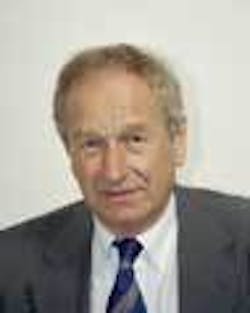GEP promotes interests of French upstream contractors, suppliers
Association in frame to build Venezuelan offshore sector
Jeremy Beckman, Editor, Europe
Mainstream engineering companies in France are taking note of the oil and gas industry’s sustained resurgence. Electrical switchgear, logistics, and catering groups are typical of the categories seeking to play their part.
Lobbying on their behalf is GEP, the trade association promoting the interests of French upstream/downstream contractors and suppliers. Over the past year, membership has surged from 130 to 150, according to GEP’s Managing Director, Claude Berbigier.
“Many of the new intake are small companies,” he says, “who think the oil industry is booming and want to try their luck. But we have also been approached by big contractors wanting to enter this business, such as telecommunications giant Alcatel.” Another new member is Foster Wheeler France.
At home in France, GEP organizes monthly “club” meetings, which are normally well attended. At a recent get-together, Total made a presentation to representatives of 160 suppliers outlining its plans and future requirements. Gaz de France and Technip have given similar overviews; in return, suppliers have the opportunity to present their capabilities.
“It’s also useful,” Berbigier says, “for our members to learn of the potential problems ahead. It is not easy for oil companies, however large, to bring foreign suppliers to new countries.” Jean Ropers, a former Total executive, and now President of the Paris-based consultative committee under the French Ministry of Industry, CEPM, says, “Some companies in France and elsewhere don’t understand the problems the majors have with technology transfer. They don’t realize that much of the time, Total and others are acting as a contractor to state-owned companies, with certain operating limits.”
Nevertheless, E&P growth is creating opportunities in many new regions. GEP organizes regular trade missions overseas for its members, designed to facilitate contact with decision-makers at state-owned companies. According to GEP’s President Dominique Michel, recent destinations included Mauritania, Iran, and Abu Dhabi. Based on members’ recommendations, GEP is now working on establishing links in Malaysia -- with Petronas Carigali -- Russia’s Tyumen region, the northern Caspian, and Canada’s heavy oil fraternity in Alberta.
“One other country interesting us is Venezuela,” Michel says, “as they are keen to develop their offshore sector. We have been asked to make a proposal in order to help them build an indigenous offshore service and contracting industry from scratch, as part of their long-term plan to double their production to 4 MMb/d.”
Much of this increase would come from shallow water reserves off Venezuela’s Caribbean coast, which could be developed, GEP believes, by transferring technologies applied in similar water depths in the Persian Gulf on the South Pars projects. French companies such as Doris and Technip have been closely involved in these projects over the past decade.
Venezuela has a well-developed onshore service sector, but according to Michel, its Caribbean ports are not equipped either for offshore logistics or platform fabrication. However, during a recent visit to France, Michel says, President Hugo Chavez revealed his determination to build a comprehensive range of offshore infrastructure, along the lines of Brazil and Mexico.
Funding/recruitment
GEP and CEPM also collaborate to help small and mid-size companies develop new technologies. One example, according to Ropers, involved bringing together robotics specialists Cybernetix, ECA, Emc3, and Ifremer to work on the next generation of autonomous underwater vehicles.
Niche offshore companies in France, as elsewhere, are often formed by individuals that have left oil companies because their ideas were not taken into account, or lacked sufficient funding. “The problem for Total, and other majors,” Ropers says, “is that they generally associate with the large contractors, who take it upon themselves to filter out alternative concepts. But project teams are preoccupied developing more and more complicated fields, so they don’t have time to study what else might be on offer.”
Another paradox Ropers has noticed is that growing demands on oil companies’ offshore operations are sucking the best brains away from their R&D centers. “The work levels are simply too high.”
While CEPM can offer limited funding for research from the French government, levels of assistance are not what they were, and support from Brussels is in short supply, due to the European Union’s continuing concerns over hydrocarbons. “Maybe governments in Europe have the impression the oil and gas industry is awash with money,” Ropers says. “But no industry in the world can achieve step changes such as Canyon Express and Thunder Horse all by itself, without some outside help.”
Recruitment is another lingering concern, with the average age of France’s offshore engineers still much too high, says Berbigier. This is partly an image issue, which Total has tried to address by staging road shows promoting the oil industry’s work in schools throughout France.
GEP, in association with CEPM and AFTP, a society for petroleum professionals, has also organized “hydrocarbon days”, aimed at attracting young people from French schools and colleges into the industry. But money is another issue, says Michel, with even trained drilling engineers being tempted away by the doubled salaries on offer in the finance sector.

